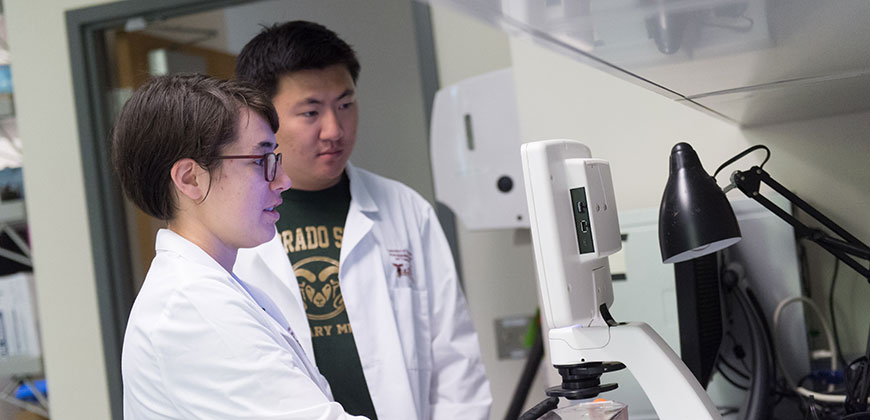
Students Callie Rogers and Edward Cheng work with cancer cells in the Laboratory of Comparative Musculoskeletal Oncology and Traumatology at Colorado State University’s James L. Voss Veterinary Teaching Hospital.
Colorado State University’s School of Biomedical Engineering (SBME) is proudly the first accredited undergraduate biomedical engineering program in the state of Colorado.
SBME is also the first accredited biomedical engineering degree in the country that has an obligatory tie to a partner degree in chemical and biological engineering, electrical engineering, or mechanical engineering. Biomedical engineering students receive degrees from both SBME and one of those disciplines. As an interdisciplinary program, biomedical engineering allows students and faculty alike to pursue research and education at the intersection of the life sciences, engineering and medicine.
The school was established at CSU at the graduate level in 2007 by Susan James, professor of mechanical engineering, who also planted the seed for an undergraduate program that welcomed its first students in 2010.
Under the leadership of undergraduate program director Kevin Lear, professor in electrical and computer engineering, SBME has grown to an enrollment of over 400 students as of fall 2016. Graduates of the undergraduate program have gone on to pursue degrees at various institutions including Stanford University School of Medicine and Massachusetts Institute of Technology, as well as careers at local and national companies, like Terumo BCT, Medtronic and Applied Medical.
Advantages to the two-degree program in industry
Lane Taylor, a graduate of the program and currently employed at Medtronic, explained that SBME helped him better understand the relationship between engineering and science. “The program gave me an incredible foundation in biology and in mechanical engineering fundamentals, and helped draw a link between the two. Several classes helped bridge the gap between engineering and science, and taught me to successfully apply engineering principles to health and bio problems,” he said.
The SBME community is gender diverse, with a female enrollment rate of 45 percent – higher than any other engineering department. Because undergraduate students must pursue two majors in the program, the introduction of SBME has also helped raise female enrollment rates in every partner engineering department.
Nicole Puissant, a product development engineer at Terumo BCT, felt that the biomedical engineering program at CSU, helped her start making an impact soon after completing her undergraduate degree. “I feel like the biomed degree gave me enough of a background in the other engineering majors that I am comfortable making educated decisions at my company,” she said.
According to the Accreditation Board for Engineering and Technology (ABET), “students, employers, and the society we serve can be confident that [an accredited] program meets the quality standards that produce graduates prepared to enter a global workforce.” The accreditation is retroactive for all prior graduates of the B.S. in biomedical engineering program.